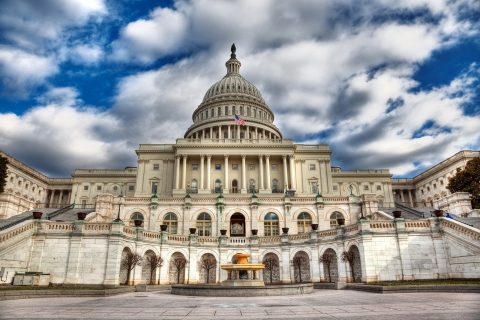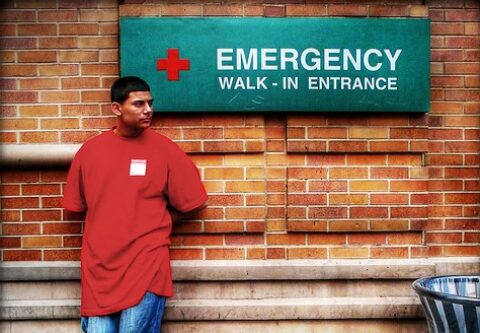Economics

Help Wanted: Broken Immigration Policies Equal Broken Government Responses
This past week, ImmigrationImpact highlighted aspects of a recent Immigration Policy Center (IPC) report, Breaking Down the Problems, What’s Wrong With our Immigration System?. The report highlights the problems faced by American families, businesses, and workers, all caught in a broken immigration system. But the report also addresses the long-term effect of our broken immigration laws on government. Put simply, broken laws equal broken government. Read More

Risky Business: Our Broken Employment–Based Immigration System Jeopardizes the American Economy
BY CHARLES H. KUCK* Does Congress's continued failure to fix our broken employment-based immigration system jeopardize our economy, now and in the future? Yes, it does. If we don't have enough employment-based immigrant visas, the best and brightest from around the world will start going somewhere else. We are not only a nation of immigrants; we are a nation of successful immigrants. We attract those who are willing to work hard, better themselves, and strive for success. However, our legal immigration system has made the process of immigration to the United States so difficult, so full of uncertainty, and so lengthy, that folks are now choosing not to come. Read More

Family Ties: A Closer Look at the Problem with Our Family-Based Immigration System
The U.S. immigration system has always promoted family unity by awarding the majority of visas to the families of current U.S. residents, which ensures that close family members are not kept apart. The principle of family unity has long been a central tenet of our immigration laws and has contributed to the economic and social prosperity of our country and immigrant populations. Read More

Immigration Gumbo in the Pelican State
The Pelican State is slowly stepping out as one of the most dynamic immigrant states in the nation. With a New American governor, an immigrant congressman and growing numbers of immigrants calling Louisiana home, the state is emerging as a model for what immigration can do for a state. One of Louisiana’s most famous faces is the state’s Governor Piyush “Bobby” Jindal who was born in Baton Rouge after his parents immigrated to the U.S. for graduate school and distinguished careers. He is the first American governor of Indian descent to serve in the U.S. Read More

Senator Vitter’s Amendment is Gumming Up the Census
By now, we’ve grown accustomed to Senators attempting to score political points at home through anti-immigration amendments, regardless of the topic of the underlying bill. Still, Senator David Vitter’s amendment to the Commerce, Justice and State appropriations legislation, which would cut off financing for the 2010 Census unless the survey includes questions about immigration status, is pretty convoluted—especially for a politician from a state still struggling to recover from the tragedy of Hurricane Katrina. Read More

Nobel Prize Winners and Immigration Policy
Digital cameras, cancer and aging research, and technology networks that carry voice, video and high-speed internet data around the world are just a few reasons to thank this year’s Nobel Prize winners. We can also thank smart immigration policy that brought three of this year’s winners to our shores in addition to a young student from Kenya whose son is this year’s winner of the Nobel Peace Prize. Who are these foreign-born innovators? Read More

Report Details Dangers of Denying Health Care Coverage to Legal Immigrants
Last week, the Senate Finance Committee completed its mark up of its health care reform bill. Amendments that would have further restricted legal immigrants’ access to health care and imposed burdensome new verification requirements on everyone failed in the committee. Now both the Senate and the House have their work cut out for them as they combine various bills into one and bring them to the floor for final votes. It’s likely that we will see additional attempts to save money by cutting health care to legal immigrants. It’s also likely that more political statements about denying benefits to illegal immigrants will arise. This week the Migration Policy Institute released a new report, Immigrants and Health Care Reform: What’s Really at Stake? This groundbreaking report provides cold hard facts about the numbers of immigrants that would be affected by the various proposals in Congress. When analyzing the dangers of denying health care coverage to legal immigrants, MPI’s report examined Census data and discovered that: Read More

New Report from Cato Institute Highlights Economic Benefits of Legalizing Unauthorized Immigrants
Leading economists agree that the cornerstone of any immigration reform bill should be some form of legalization for the roughly 12 million undocumented immigrants currently living in the United States. Critics of legalization, namely enforcement-only cheerleaders, fail to realize that legalization would improve wages and working conditions for all workers—including the native-born—and would yield a net benefit to the recovering U.S. economy. One study estimates that an immigration reform bill which includes legalization would yield a net benefit of $180 billion over a ten-year period, while enforcement efforts alone would actually cost $80 billion over the same period. Read More

States and Localities Critical to Immigration Policies
Governors and mayors, state legislatures and city councils are playing an increasingly critical role in U.S. immigration policy. As a result of Congress’s inaction, states and localities are feeling pressure to take action on immigration, and many of the policies that directly impact immigrants’ lives—law enforcement, public benefits, driver’s licenses—are being driven by new state and local laws. Some state and local immigration policies have been positive and have helped to integrate immigrants into American communities. Others, however, have had a harmful impact on immigrants as well as on public health and safety. The National Conference of State Legislatures (NCSL), a bipartisan organization that serves the legislators and staffs of the nation's 50 states, recently published two documents that highlight the role that states play in immigration policy. One is a report on recent state activity, and the other is NCSL’s official immigration policy statement. Read More

In Order to Form a More Perfect Union
As America celebrates its 233rd birthday, we are reminded of the many contributions immigrants have made to America throughout our great history. Nowhere will this be more celebrated than in the 50 naturalization ceremonies taking place around the nation this weekend where 6,000 immigrants will become Americans at venues like Disneyworld and George Washington's Mount Vernon. Five hundred of those about to pledge their allegiance to America are already defending our nation on a daily basis as members of the armed services. They will take part in naturalization ceremonies in Baghdad, Norfolk, Camp Lejeune, and Nellis Air Force Base. Read More
Make a contribution
Make a direct impact on the lives of immigrants.
